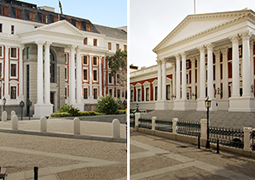
The Deputy Minister of Trade, Industry and Competition, Ms Nomalungelo Gina, has said that the South African state requires a reset button and a different approach. She was part of a panel discussion in a State Capacity Conference that was organised by the National Council of Provinces with the theme: Delineating Weaknesses, Devising Strategic Mechanisms to Accelerate Policy Implementation.
“This is a huge discussion in government, especially in the economic cluster. We need to industrialise our economy; the structure of the economy has to be anchored in manufacturing,” Ms Gina said.
She said it was unfortunate that the conference took place at a time when the economy is experiencing unprecedented challenges that include weak growth, deindustrialisation and extreme fiscal pressures. “According to the Absa Purchase Index Managers released recently, manufacturing had dropped, but causal factors are connected not only to the recent floods in KZN, but also the impact of Covid-19 and lockdowns that effectively shut down the economy and the effect of which had been the shedding of jobs.”
Other constraints on the economy include unreliable electricity supply, which is a major risk to the economy and the overall growth path. Furthermore, the auctioning of the digital spectrum, harbour congestion and regulatory delays, the impact of the 2021 unrest in KZN and Gauteng, and the Russia-Ukraine conflict are additional challenges.
“It is against this economic background that we must be strengthening the state capability to accelerate the economy, inclusive growth and competitiveness.”
A representative of the Minister of Monitoring and Evaluation, Mr Henk Serfontein, told the conference that the local sphere has challenges with capacity and that a lack of accountability and consequence management unfortunately prevail. “Debts of municipalities are increasing and municipalities are unable to pay for bulk services they are getting, revenue services are decreasing and are unable to meet their obligations. There are no actions around addressing unauthorised, irregular and wasteful expenditure.”
“Capabilities of councillors ward committees are not fully functional and this is reflected in the AG report. We not seeing the strengthening of government on financial management. Many municipalities are in dire financial position and there is a huge amount of concern around them.”
He said the DPME has a local government improvement model in which the department assisted a sample of municipalities to try and improve. “But we are finding that we do not have resources and expertise to perform oversight, and internal audit units are not as required.
“To unblock these municipalities, maintenance and investment in infrastructure projects will look at restoration and maintenance, and will look at rehabilitation of energy distribution. We are seeing deterioration in the abilities and capabilities of local government, national and provincial.
“We’ve been coming with a lot of policies and interventions to strengthen, but it does not seem that they are all yielding results that are hoped for. In financial management, we still need to see improvement in the management of public finances.”
He said as a result of lack of capability, the state’s liability was R166 billion and R4.9 billion is still owed to suppliers way past the 30 days prescribed in legislation in the public service.
The chair of the session, the Deputy Chairperson of the National Council of Provinces, Ms Sylvia Lucas, welcomed the input and characterised it as “Proper diagnostic” that will give Parliament an idea of where the loopholes were as well as the strengths of the system.
Ms Gina said the District Development Model is considered to be an instrument of breaking down silos and enforce planning at all levels of government. “We are beginning to see signs of coordination.”
She said the unrest in KwaZulu-Natal and Gauteng was a fundamental setback to the efforts to repair the economy. She added: “Decisive leadership is needed, the issue of coordination, integration of plans is needed. There is nothing that beats human spirit; this country will recover under these difficult conditions were are in.”
Ms Lucas said there will be follow-up workshops building on the recommendations of the conference. “This gave us a broader perspective of how different industries can contribute to stabilise the economy. We are having this kind of situation where the economy is regressing particularly due to Covid and other factors.
Sibongile Maputi
9 May 2022

